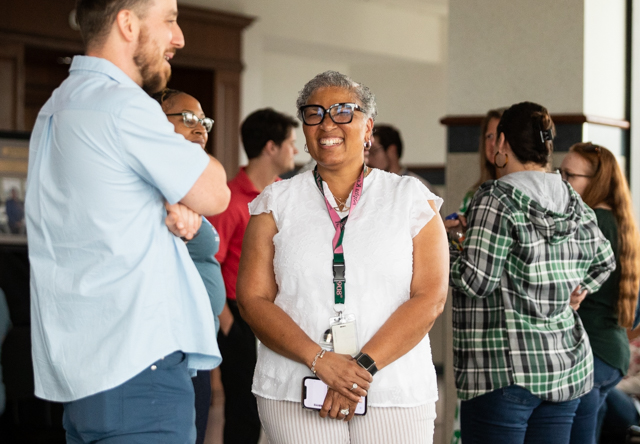Immigrants ‘absolutely afraid’ after Trump named president-elect
Published 4:46 pm Saturday, December 3, 2016
Immigrants, refugees and even some international college students are fearful or uncertain about what to expect from President-elect Donald Trump, who campaigned on idealogical screening for immigrants and ending protections for those who are undocumented.
Local immigration attorney Judy Schwank ranks the level of anxiety of immigrants she’s dealt with at about “90” on a scale of 1 to 10.
Trending
“They are absolutely afraid of what’s going to happen,” Schwank said. “My phone doesn’t stop ringing.”
Carlos D’Angelo Bailey, who’s also an immigration attorney in Bowling Green, said he’s seen “huge fear” from immigrants worried that they’ll be rounded up and deported. Bailey said the fear is especially heightened for some 750,000 immigrants shielded under the federal government’s Deferred Action for Childhood Arrivals program.
DACA allows certain people who came to the U.S. as children and who meet several guidelines deferred action on their legal status for a period of two years, subject to renewal, according to U.S. Citizenship and Immigration Services.
Despite being otherwise productive citizens who go on to college or join the military, those protected under DACA fear potential retribution.
“They have their fingerprints. They have their IDs. They have their address,” Bailey said. “The address that they have can be associated with individuals that may not be documented – their parents, their grandparents. So there’s a huge fear that because the government had their address, their ID … that it could be used to come back to be used against them or even their loved ones.”
On his campaign website, Trump laid out a 10-point immigration action plan. In that plan, Trump vowed to build an impenetrable physical wall on the U.S.-Mexican border paid for by Mexico, remove criminal immigrants on day one and enforce immigration laws more rigorously than the Obama administration. However, between 2009 and 2015, the Obama administration deported more than 2.5 million people through immigration orders, more people than any other administration in history and more than all the other 20th-century administrations combined, according to news reports. Trump has also since waffled on what the wall will look like, saying it may just partially be a fence.
Trending
Trump also took issue with the prospect of increasing refugee admissions into the U.S., describing that situation as a potential “Trojan horse.”
“We don’t know where these people come from. We don’t know if they have love or hate in their heart, and there’s no way to tell,” he said. “We can’t let these people come into our country. We have enough problems.”
Albert Mbanfu, executive director of the International Center of Kentucky, said Trump’s rhetoric has heightened anxieties for the refugees the center helps resettle.
“After the presidential election and the results came out that Trump had won, the following day there was a lot of uncertainty and confusion in the office because during the campaign refugees were targeted and were scapegoated,” he said.
Mbanfu said refugees worried they’d be sent back to their home countries, where they fled violence and persecution.
“I told them that for now nothing has changed they don’t need to worry and that it’ll be difficult for them to be sent back and that they are in the country legally,” he said. “Since then, things have died down a little, but there is still that underlying concern.”
Mbanfu said that concern extends to those working in refugee resettlement agencies and those compassionate to refugees’ plight.
“They are all worried because some of these people that we help to escape from harm to home come from some of these areas where there’s the talk of doing some extreme vetting or probably halting refugee admissions from those areas,” he said.
Mbanfu is skeptical about terrorists posing as refugees to enter the country. He said refugees are already screened through terrorist databases. He also remains uncertain of Trump’s talk of “extreme vetting” and idealogical screening for immigrants to ensure they share American values.
“You can’t read what’s in people’s mind. They can give you whatever response you want to get,” he said. “We will just have to wait and see what extreme vetting means or what it involves.”
The International Center has not yet begun resettling the 40 Syrian refugees it agreed to resettle in Bowling Green, although they’ll be resettled sometime between now and Sept. 30 next year.
“We don’t have any in our pipeline right now,” Mbanfu said. “Meaning I don’t envision seeing them coming even the first quarter of next year. I’m not sure.”
Concerns about what action Trump will take are also extending to international students at Western Kentucky University.
WKU Provost David Lee said that at least one student asked if they could be deported by a Trump administration. Lee and President Gary Ransdell attended a post-election student forum to answer questions.
“It was essentially a forum or an opportunity for international students to express any concerns that they had or to raise any questions. I think about 50 students attended,” Lee said, adding it was for addressing “concerns about their status in the aftermath of the election.”
Lee called the forum interesting and constructive.
“A number of questions were around very basic things like what’s the difference between a Democrat and a Republican. One student wanted to know what the electoral college was. So a number of questions were around simply understanding the mechanics of American politics,” he said. “I do remember one student asking if he or she could be deported, but I mean the short answer to that is no. Our students are all in the country legally.”
A night after Trump won the election, students rallied outside Pearce-Ford Tower for a protest that resulted in the misdemeanor arrests of five people.
Lee said that “fairly emotional” response from students has since shifted to how to move forward with the results.
Despite recent racial incidents, such as when an African-American student had a racial epithet carved into her car, the university is committed to being as welcoming as possible, Lee said. That includes dealing effectively with people who aren’t respectful of the traditions and values of others, either through student disciplinary processes or police action if criminal.
“The university is committed to being as welcoming as it possibly can be,” he said.
Meanwhile, Schwank and Bailey are continuing to navigate problems in the what they describe as a broken legal system for immigrants.
“I have hearings scheduled for 2024 in October,” Schwank said. “That’s how far behind the immigration system is, and we don’t have enough trained prosecutors, enough trained judges and certainly not enough trained defense bar. And because things just get continued and continued … I went to court Monday in Louisville with eight clients I think and at least two of those cases the next hearing’s in 2018.”
Schwank worries about a potential move from Trump to kill Deferred Action for Childhood Arrivals, a fear that Bailey shares. The program could be easily dissolved by an executive order from Trump, Bailey said.
Schwank said immigrants come here primarily for safety and not economic reasons.
“Latin America is chaotic and I would say on fire between the drug lords and the gangs. The extortion problems there are incredible,” Schwank said.
Guillermo Castillo, who’s an applicant for asylum from Guatemala, is volunteering with Schwank’s law firm. Castillo has a nonprofit back home and works with countries in central America.
Castillo said the main reason people are fleeing the region is because of corruption in those countries.
“Back in the community, they have no opportunities or there’s violence, or there’s narco-trafficking, or there’s organized crime,” he said, adding central American governments are complicit.
Castillo said governments are trying to push as many migrants as possible to the U.S. in an effort to profit by laundering money from remittances sent back to immigrants’ home countries.
“That money never arrives to the country itself because they use the cash for narco-traffickers,” he said.
If immigrants are deported, Castillo said “the only option that they get is join the narco-traffickers, organized crime, gangs or die.”
Ultimately, Castillo said, it creates a cycle of migrants pushed into the U.S. then deported and forced to work for gangs or as prostitutes.
One of Schwank’s clients, David Matias Carrillo, fell into that category. Carrillo came to America legally, but later returned to his community in Guatemala. Carrillo said he was “beaten and discriminated” by gangs, who punished him for refusing to smuggle drugs across the U.S. border.
While beating him, the gangs targeted his club foot, and he now needs an amputation, Schwank said.
For Bailey, what makes America great is its diversity and its vision of being a welcoming, shining “city on a hill.”
“I think that before this election a lot of people thought we were getting closer to that city on a hill or that myth of the city on a hill,” he said. Many will have to confront the disappointment that America isn’t there yet, Bailey said.
— Follow education reporter Aaron Mudd on Twitter @BGDN_edbeat or visit bgdailynews.com.







